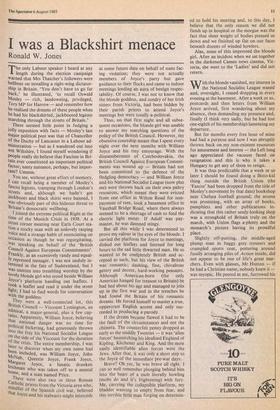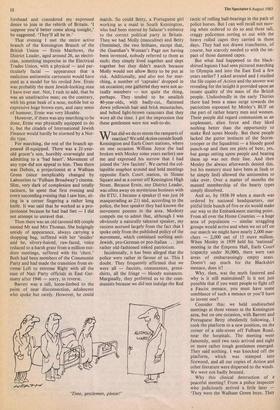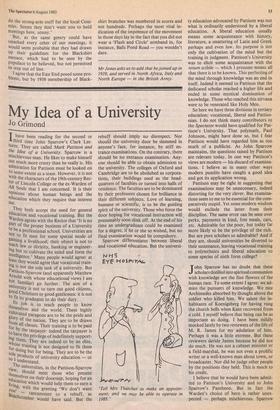I was a Blackshirt menace
Ronald W. Jones
The only Labour speaker I heard at any length during the election campaign warned that Mrs Thatcher's followers were hellbent on installing a right-wing dictator- ship in Britain. 'You don't have to go far back,' he illustrated, `to recall Oswald Mosley — rich, landowning, privileged, Tory MP for Harrow — and remember how he realised the dreams of these people when he had his blackshirted, jackbooted legions marching through the streets of Britain.'
There seemed little point in fudging a jolly exposition with facts — Mosley's last major political post was that of Chancellor of the Duchy of Lancaster in a Labour ad- ministration — but as I wandered out into Wet Wiltshire, '1 found myself wondering if people really do believe that Fascism in Bri- tain ever constituted an important political factor; nasty nuisance, perhaps, but impor- tant? Ummm.
You see, without great effort of memory, I can recall being a member of Mosley's fascist legions, tramping through London's streets and, although we hadn't got jackboots and black shirts were banned, I was obviously part of this hideous threat to Britain's democratic wellbeing.
I joined the extreme political Right at the time of the Munich Crisis in 1938. At a street corner meeting near Earls Court sta- tion a stocky man with an unlovely rasping voice and a strange habit of enunciating on occasion as though he was regurgitating, Was speaking on behalf of the 'British Council Against European Commitments'. Frankly, as an excessively randy and equal- ly repressed teenager, I was not unduly in- terested in the fate of Sudetenland, but I was smitten into trembling worship by the lovely blonde girl who stood beside William Joyce's platform handing out leaflets. I took a leaflet and read it under the street light; I had to find words for conversation with the goddess. They were a well-connected lot, this British Council — Viscount Lymington, an admiral, a major-general, plus a few cap- tains. Apparently, William Joyce, believing that national danger was no time for Political bickering, had generously thrown into the fray his National Socialist League on the side of the Viscount for the duration rthe crisis. The entire membership, 1 was
er to discover when my own name had
!Dat
een included, was William Joyce, John _eNah, Quentin Joyce, Frank Joyce, Margaret Joyce, a lunatic drunken Irishman who was taken off to a mental home, and a man named Price.
There were also two or three Roman Catholic priests from the Victoria area who, mindful of the Spanish civil war, believed that Joyce and his stalwarts might intercede at some future date on behalf of nuns fac- ing violation; they were not actually members of Joyce's party but gave guidance to their flocks and came to indoor meetings lending an aura of benign respec- tability. Of course, I was not to know that the blonde goddess, and sundry of her Irish sisters from Victoria, had been bidden by their parish priests to attend Joyce's meetings but were totally a-political.
Thus, on that first night and all subse- quent occasions, the blonde girl was unable to answer my searching questions of the policy of the British Council. However, my obsessive courtship meant that I spent every night over the next months with William Joyce and his tiny entourage. With the dismemberment of Czechoslovakia, the British Council Against European Commit- ments was wound up — Britain had not been committed to the defence of the fledgling democracy — and William Joyce and his National Socialist League (now plus me) were thrown back on their own paltry resources, which meant they were evicted from one office in Wilton Road for non- payment of rent, took a basement office in Vauxhall Bridge Road, where there always seemed to be a shortage of cash to feed the electric light meter. If Adolf was pay- master, he was damned stingy.
But all this while I was determined to prove my valour in the eyes of the blonde. I carried the platform for Joyce to meetings, dished out leaflets and listened for long hours to the sad little thwarted man. He so wanted to be conipletely British and ac- cepted as such, but his view of the British was romantic; dashing, fine, chivalrous gentry and decent, hard-working peasants. Although American-born (the only American hanged for treason to Britain) he had lied about his age and managed to join up in the first war and in the trenches he had found the Britain of his romantic dreams. He forced himself to master a true, uppercrust English accent and only suc- ceeded in producing a, parody.
If the dream became flawed it had to be the fault of the circumstances and not the chimera. The counterfeit penny dropped as early as the middle Twenties — it was 'alien forces' besmirching his idealised England of Kipling, Kitchener and King. And the most easily identifiable alien forces were the Jews. After that, it was only a short step to the Joyce of the immediate pre-war days.
Brave? Oh yes, he was brave all right. I can so well remember plunging behind him into the heart of a mob literally howling (mobs do and it's frightening) with fury. Me, carrying the collapsible platform, my bladder wanting to empty from fear, and this terrible little man forging on determin-
ed to hold his meeting and, to this day, I believe that the only reason we did not finish up in hospital or the morgue was the fact that sheer weight of bodies pressed us down and we finished up flat on our faces
beneath dozens of this howlers.
Alas, none of this impressed the blonde girl. After an incident when we sat together in the darkened Cameo news cinema, Vic- toria, she went to the 'Ladies' and did not return.
With the blonde vanished, my interest in the National Socialist League waned and, overnight, I ceased dropping in every evening at the basement. After a week or so, postcards and then letters from William Joyce arrived, first wondering about my absence, then demanding my presence and, finally (I think very sadly, but he had lost one-eighth of his membership) lamenting my departure.
But for months every free hour of mine had had a purpose and now I was abruptly thrown back on my non-existent resources for amusement and interest — the Left long ago appreciated the vacuum faced on resignation and this is why it takes a Hungary to get any of them to resign.
It was thus predictable that a week or so later I should be found doing a Bisto-kid thing outside the British Union (the 'Fascist' had been dropped from the title of Mosley's movement by that date) bookshop near Chelsea football ground; the aroma was promising, with an array of books, pamphlets and other publications in- dicating that this rather seedy-looking shop was a stronghold of Britain truly on the march, with Union flags a-plenty and the monarch's picture having its proudful place.
Slightly off-putting, the middle-aged plump man in baggy grey trousers and crumpled sports coat, pottering around fussily arranging piles of Action inside, did not appear to be one of life's great mar- chers. Even with glasses, Mr Hutton — if he had a Christian name, nobody knew it was myopic. He peered at me, furrowed his
forehead and considered my expressed desire to join in the rebirth of Britain. '1 suppose you'd better come along tonight,' he suggested. 'They'll all be in.'
That evening I met the entire active branch of the Kensington Branch of the British Union — Ernie Matthews, the District Leader, aged around 26, an electri- cian, something imprecise in the Electrical Trades Union, with a physical — and par- ticularly facial — appearance that a malicious antisemitic cartoonist would have used as a model for his reviled Jew. Ernie was probably the most Jewish-looking man I have ever met. Not, I rush to add, that he was an unattractive man; on the contrary, with his great beak of a nose, mobile but so expressive huge brown eyes, and zany sense of humour, Ernie was very likeable.
However, if there was any marching to be done, Ernie was physically equipped to do it, but the citadels of International Jewish Finance would hardly be stormed by a Nor- dic type.
For marching, the rest of the branch ap- peared ill-equipped. There was a 21-year- old grocer's son, horribly overweight and admitting to a 'bad heart'. Movement of any type did not appeal to him. Then there was Dubois, a projectionist at a Walham Green (since inexplicably changed by Labourites to 'Fulham Broadway') cinema. Slim, very dark of complexion and totally taciturn, he spent that first evening and every succeeding evening that I saw him, sit- ting in a corner fingering a rather long knife. It was said that he worked as a pro- jectionist because he had bad feet — I did not attempt to unravel that.
Then there was an old (around 60) couple named Mr and Mrs Thomas. She bulgingly untidy of appearance, always carrying a shopping bag, suffered with her 'insides' and he, silvery-haired, raw-faced, voice reduced to a harsh grate from a million out- door meetings, suffered with his 'chest.' Both had been members of the Communist Party and had made the transition from ex- treme Left to extreme Right with all the ease of Nazi Party officials in East Ger- many after 1946 — sorry, in reverse.
Barrett was a tall, loose-limbed to the point of near disconnection, adolescent who spoke but rarely. However, he could march. So could Betty, a Portuguese girl working as a maid in South Kensington, who had been steered by Salazar's embassy to the correct political party in Britain. Then we had Molly (masculine) and Betty (feminine), the two lesbians, except that, the Guardian's Woman's Page not having been invented, nobody referred to them as such; they simply lived together and slept together but they didn't march because Molly would not allow Betty to be put at risk. Additionally, and also not for mar- ching, a number of 'captains' dropped in on occasion; one gathered they were not ac- tually members — not quite the thing, perhaps. They tended to be smallish 40-year-olds, with badly-cut, flattened down yellowish hair and brisk moustaches, and belted light-brown raincoats that they wore all the time. I got the impression that these gentlemen were not well-to-do.
What did we do to storm the ramparts of reaction? We sold Action outside South Kensington and Earls Court stations, where on one occasion William Joyce (he had broken with Mosley some years earlier) saw me and expressed his sorrow that I had joined the 'Jew fascists'. We carted the col- lapsible soapbox around and held meetings opposite Earls Court station, in Sloane Square and at a corner off Kensington High Street. Because Ernie, our District Leader, was often away on mysterious business with the ETU, I became a speaker (I was just 16 masquerading as 21) and, according to the police, the best speaker they had known the movement possess in the area. Modesty compels me to admit that, although I was obviously a naturally talented speaker, my success accrued largely from the fact that I spoke only from the published policy of the movement, which contained nothing anti- Jewish, pro-German or pro-Italian ... just rather old-fashioned naked patriotism.
Incidentally, it has been alleged that the police were rather in favour of us. This I doubt. They frequently affirmed that we were all — fascists, communists, green- shirts, all the fringe — bloody nuisances. Marginally, they preferred us to the com- munists because we did not indulge the Red 'Time, gentlemen, please!' tactic of rolling ball-bearings in the path of police horses. But I can well recall not mov- ing when ordered to do so and three tall, craggy policemen sorting us out with the heavy rolled capes they carried in those days. They had not drawn truncheons, of course, but scarcely needed to with the im- pact of those damned capes.
But what had happened to the black- shirted legions I had seen pictured marching to Olympia and into the East End a few years earlier? I asked around and I studied the file copies of Action and the answer was revealing for the insight it provided upon an innate quality of the mass of the British people. Undoubtedly in the early Thirties there had been a mass surge towards the patriotism espoused by Mosley's BUF on the part of rather hearty men and women. These people did regard communism as an unpleasant, alien force and they liked nothing better than the opportunity to make Red noses bloody. But these people lacked the gutter instincts of the Storm- trooper or the Squadristi -- a bloody good punch-up and then ten pints of beer, yes, but gangs setting upon people and beating them up was not their line. And then Mosley (he always afterwards denied this, but his memory must have been at fault or he simply lied) allowed the antisemites to take over. Over a matter of months the massed membership of the hearty types simply dissolved.
And so, by 1938-39 when a march was ordered by national headquarters, our pitiful little bunch of five or six would make our way to the Embankment starting point. From all over the Home Counties — a huge area of population — similar straggling groups would arrive and when we set off on our march we might have nearly 2,000 mar- chers — 2,000 out of 15 more million. When Mosley in 1939 held his 'national' meeting in the Empress Hall, Earls Court (capacity under 30,000), there were vast areas of embarrassingly empty seats. Doesn't say much for the Blackshirt menace, does it?
Why, then, was the, myth fostered and why is it still maintained? Is it not just possible that if you want people to fight off a Fascist menace, you must have some semblance of such a menace or you'll have to invent one?
Consider this: we held undisturbed meetings at three venues in the Kensington area, but on one occasion, with Barrett and Portuguese Betty obediently following, I took the platform to a new position, on the corner of a side-street off Fulham Road, near the hospitals. The meeting went famously, until two taxis arrived and eight or more rather tough gentlemen emerged. They said nothing. I was knocked off the platform, which was stamped into firewood, and all our copies of Action and other literature were dispersed to the winds. We were not badly bruised.
Why this clinical destruction of a peaceful meeting? From a police inspector who judiciously arrived a little later 'They were the Walham Green boys. They do the strong-arm stuff for the local Com- mies. Seems they don't want you to hold meetings here, sonny.'
But, as the same gentry could have smashed every other of our meetings, it would seem probable that they had drawn up their guidelines for the Blackshirt menace, which had to be seen by the populace to be believed, but not permitted to step out of line.
I agree that the East End posed some pro- blems, but by 1938 membership of Black- shirt branches was numbered in scores and not hundreds. Perhaps the most vital in- dication of the impotence of the movement in those days lay in the fact that you did not wear a 'Flash and Circle' armband in, for instance, Balls Pond Road — you wouldn't dare.
Mr Jones asks us to add that he joined up in 1939, and served in North Africa, Italy and North Europe — in the British Army.








































 Previous page
Previous page